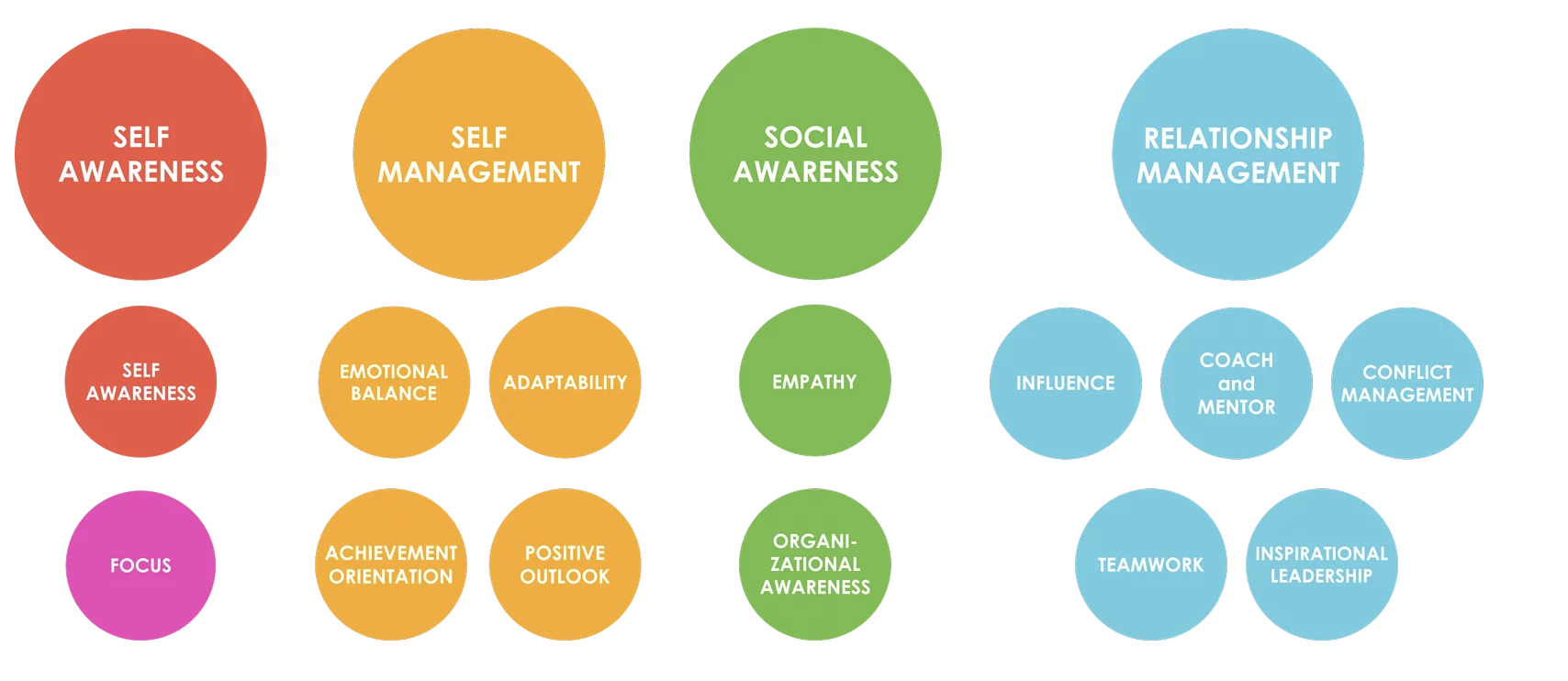Emotional intelligence (EQ) is important in our work and personal lives. It helps us manage and resolve conflict and support others with empathy, which in turn helps us build stronger relationships with others.
EQ also helps us accept and deliver criticism calmly and be comfortable saying no, which are valuable skills we need at work.
But how does this fit in with SEO?
We work with and manage people from different backgrounds and cultures globally on a remote basis across many time zones, so delivering the goals set by different stakeholders can be difficult.
In SEO, we often work across disciplines, such as working with designers and developers. Every team has different key performance indicators (KPIs) and this requires negotiation.
It is important to understand others and communicate effectively so we can work towards the same goal.
Emotional intelligence helps us to better communicate and work together.
Being able to say “no” is also very important in SEO, as sometimes you may be the only SEO professional in the company and be expected to do many aspects of SEO.
Others might assume you will do technical support, content writing, strategy, and be a GA4 expert. This is unrealistic and will lead to you being overwhelmed and not reaching your KPIs.
What Is EQ?
EQ, also known as emotional intelligence, is how we handle our own emotions and perceive the emotions of others. It was first coined by psychologists Peter Salovey and John D. Mayer in 1990.
EQ is the:
“Ability to understand, use, and manage your own emotions in positive ways to relieve stress, communicate effectively, empathize with others, overcome challenges and defuse conflict.”
The primary components of EQ are:
- Perceiving emotions.
- Reasoning with emotions.
- Understanding emotions.
- Managing emotions.
Daniel Goleman revolutionized how we think about intelligence. He pioneered the idea that emotional intelligence is more important than IQ.
Prior to his book Emotional Intelligence: Why It Can Matter More Than IQ, IQ was always seen as more important.
Published in 1995, it was a best seller for a year and a half and has been translated into 40 different languages.
There Are 5 Elements Of EQ
- Self-awareness.
- Self-regulation.
- Motivation.
- Empathy.
- Social Skills.
Self-Awareness
This involves knowing and understanding one’s own emotions and recognizing their impact on yourself and those around you.
It means understanding one’s own strengths and limits. When someone is able to recognize and understand their own feelings and emotions, they can understand others.
When we apply this to SEO, we should be able to recognize the different areas of SEO we know well and those where we need more support.
For example, if an SEO director does not grasp technical SEO well and does not admit they need help, they may be more defensive when talking to the development team.
Instead, they should ask the development team to explain in layman’s terms how to resolve a technical problem, and they could then learn from that.
This means the SEO director may end up having a difficult relationship with the development team, and technical changes may take longer.
Self-Regulation
Self-regulation is controlling one’s own behavior and emotions. It involves pausing between a feeling and an action.
It is about taking the time to think things through, make a plan, wait patiently, and then act. Often, children struggle with these behaviors, but surprisingly, many adults do too.
Motivation
This is the ability to self-motivate and not rely on external praise or rewards.
People with high motivation can focus on achieving internal or self-gratification, and they tend to be more committed and goal-focused than those who want constant praise and reassurance.
At work, there may be some team members who are only motivated if their manager praises them for their work. If many different teams are collaborating on a project and the KPIs do not align with those their manager gave them, they may be less likely to want to work on that task.
Being aware of these people in the team will help address these issues and find common KPIs that all will be happy to work towards.
Empathy
Empathy means being a good listener and slow to judge.
Those with empathy are less likely to be self-centered. They can recognize and understand how others are feeling and consider those feelings before responding in social situations.
Empathy also allows an individual to understand the dynamics that influence relationships, both personal and in the workplace.
Empathy is one of the most important leadership skills.
When building and running a team, especially in SEO, where there are different job roles such as developer, content creator, SEO specialist, and UX designer, it is important to set time aside in one-to-ones to discuss how employees are feeling at work.
Are they valued, do they feel they are being listened to, are they confused with the updates in search, do they have enough support? Empathy is also crucial when hiring especially when hiring remotely and to work in a remote team.
Social Skills
Those with great social skills find it easy to collaborate with others, and they tend to be great leaders.
They are able to manage the emotions of others through emotional understanding, and they can use this to build rapport and connect with others.
They are active listeners and are aware of nonverbal communication.
The (EI) Model
Daniel breaks the above into 12 essential competencies.
The Daniel Goleman Emotional Intelligence (EI) Model is shown below. His course helps individuals become better selves, great leaders, and build high-performance teams.
Read more details about Daniel Goleman’s framework.
 Image from Daniel Goleman, May 2024
Image from Daniel Goleman, May 2024Why Is EQ Important?
There are numerous reasons:
- 71% of Employers Say They Value Emotional Intelligence over IQ, according to CareerBuilder Survey.
- EQ improves the physical and psychological health of people and encourages academic and business performance.
- Life-long benefits – According to Bar-On (1997), people with higher EI performed better than those with lower EI in life.
- EQ is an integral part of forming and developing meaningful human relationships. Schutte et al. (2001) carried out a series of studies to show its importance and impact.
Other reasons EQ is important is that it also impacts one’s physical health and mental health.
Physical Health
High levels of stress leads to increased blood pressure which then suppresses the immune system. This can result in being run down and so more susceptible to colds.
A suppressed immune system can lead to an increased risk of heart attack and stress can contribute to infertility. Stress also speeds up the aging process and affects mental health.
Mental Health
Uncontrolled emotions and stress can impact mental health. This then leads to anxiety and depression.
This means that a person is unable to form strong relationships, which in turn leads to loneliness and isolation which is not good for one’s mental health.
Why Is EQ Important For SEO?
When working to gain exposure for a brand, you message and connect with journalists. You reach out to them, have conversations about your brand, and build relationships.
EQ is an integral part of forming relationships and people want to work with those who they like.
Empathy is putting oneself in other shoes. When selling in SEO to the C-Suite to get buy-in, many may not understand it and only want to know about the revenue figure.
Therefore, it is important to understand the board’s KPIs, show them the data they want, and explain how SEO impacts their bottom line.
Without EQ, you would not know what the board is looking for, and you may not get their buy-in for key SEO projects.
Difference Between Low EQ And High EQ
Have you ever noticed some bosses (or colleagues) fly off the handle when you have not done exactly what they wanted? Or maybe they get annoyed if you do not answer them in a succinct manner.
They have not learned to control their emotions.
Below is a comparison to see a top-line view of the difference between those with low EQ and those with high EQ.
Those With Low EQ
- Become upset easily.
- Emotional outbursts (overwhelmed by emotions).
- Do not listen to others.
- Blame others for their problems.
- Behave insensitively.
- Feel misunderstood.
- Struggle to make long-term relationships (have few close friends).
- Have problems being assertive.
Those With High EQ
- Remain calm and composed even during stressful situations.
- Can handle difficult people with tact.
- Forgive and forget (do not hold a grudge).
- Influence others towards a common goal (even if not a leader).
- Great team player (you want to work with them).
- Understand the links between their emotions and how they behave.
- Help others.
Test Your Own EQ
It is very important to know one’s own EQ, then we can start to be self-aware and build on this.
Once we are aware of our own emotions, we can start understanding others and react better in work and social situations.
Emotional intelligence has a positive correlation with success, both individually and in a team (for example, at work).
These sites offer free EQ tests:
This post cannot go into too much detail about the different types of tests.
However, please refer to this site, which has a list of here are many paid tests to learn more about EQ.
I highly recommend that all SEO teams have their staff take the EQ test and then share some of the insights and discoveries from it in a follow-up team meeting.
In one-to-ones, share the results only if you feel comfortable, and then try and align your own personal development plan to these.
How To Improve One’s EQ
These are a few ways to improve one’s emotional intelligence, but please note I am not a psychologist. I am sharing tips from what I have read and experienced.
Self-Aware And Self-Control
It is important to be aware of one’s own feelings and emotions. Once one understands these, one can recognize them in others.
Listen to yourself. When in a stressful situation, what are your emotions? How do you normally respond? How could you respond better?
We are sometimes too busy to sit back and listen to ourselves and take note of how we’re feeling.
A good way to understand your emotions is to keep a journal and write down your feelings every day.
Empathy
To improve one’s own EQ, try to put yourself in someone else’s shoes. Consider how others feel (please note that this is different from sympathy).
Especially as a team leader, find out if there are any key issues from the team, and ask them about their goals.
Find out how you relate to others by getting 180 feedback and having those deeper conversations with key colleagues, not just the “How was your week?”
For example, if you are a team leader or manager, ask thoughtful and provocative questions such as:
“How was the week? I appreciate there were some major updates in SEO and the clients were asking a lot of questions. Let’s sit down and prep for the client meeting on Monday.”
This will show that you genuinely care about your employees and you want to help them with the work.
Mindfulness
Practice this by fully focusing on the moment – not taking photos and tweeting or posting on social media. Enjoy the moment.
Do not think about the past or the future or worry about what may or may not happen. Some people practice meditation and breathing techniques.
If all the above is too much, I strongly recommend starting with active listening when you are next at work:
Active Listening Tips
- Take note of how long you are speaking vs others in a call.
- Listen to what is not being said – this is particularly true in team and client meetings.
- Be present when the other person is talking; this is a two-way dialogue.
- Do not interrupt to give your opinion – let them finish what they are saying or asking.
- Listen to the tone of voice and emotions, what is the body language? For example, how is the client reacting to the quarterly results report in the meeting?
- Are you building the other person’s self-esteem by asking deeper questions? Are you confirming what they are saying?
- Are you present? Or do you just want to push out your agenda?
- Or are you sitting quietly, waiting for the meeting to be over?
Do not drown in your emotions; be aware of them, then control and manage them.
Communicate better with others, try and understand their perspectives, and be a better collaborator.
This will help build long-lasting relationships both at work and in one’s personal life.
More resources:
- The Best SEO Conferences For 2024-2025 (Virtual And In-Person)
- Becoming An SEO Consultant: Skills, Career Outlook & Tips For Success
- Going Solo – How To Manage Freelance Life That No One Talks About
Featured Image: Jo Juliana Turnbull





![AI Overviews: We Reverse-Engineered Them So You Don't Have To [+ What You Need To Do Next]](https://www.searchenginejournal.com/wp-content/uploads/2025/04/sidebar1x-455.png)